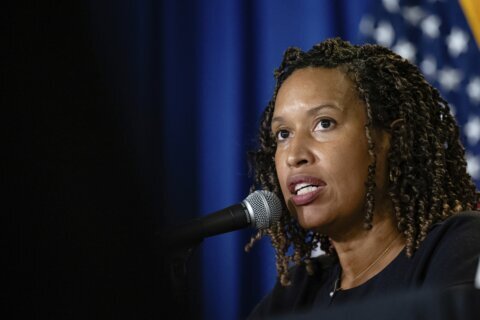D.C.’s 911 system has been hampered by inconsistent handling of calls, difficulties in determining the location of emergencies and has not met national standards for getting prompt help to callers, according to a new report by the Office of the D.C. Auditor.
The report, conducted by public safety communications consulting firm Federal Engineering, Inc. attempted to assess the effectiveness of the D.C.’s Office of Unified Communications 911 Operations Division against 2019-2020 national standards. D.C. Auditor Kathy Patterson launched the audit in February.
The 114-page report focuses on a sample of 72 calls provided by the Office of the Chief Technology Officer.
In 97% of the sample calls the appropriate number of units were dispatched. However, D.C.’s 911 did not meet national standards for how quickly calls were answered, and how quickly crews were assigned for dispatch for the majority of the two-year period, according to the audit.
“As an ex-elected official, and ex-politician, it’s always difficult to acknowledge problems with a service that’s a life or death service,” Patterson said, in a news briefing coinciding with the release of the report. “You don’t want to admit that there can be anything wrong, because it is so scary and the stakes are so high.”
The audit found four key performance issues in OUC, and offered recommendations:
A lack of adequate oversight of call-taking and dispatch operations
While the auditor determined OUC policies and procedures were consistent with industry best practices, they weren’t consistently adhered to, because of insufficient supervision and lack of quality assurance.
“This lack of consistent and present oversight has created a culture in which cliques, bullying, and uncorrected inappropriate behaviors exist. Anecdotal information from operations staff indicates that the supervisory staff may participate in and facilitate these behaviors,” according to the audit.
Inconsistent or ineffective use of scripted call handling protocols by call-takers
According to auditors, D.C.’s 911 call-takers were inconsistent in following the scripted call-handling protocols system called Criteria Based Dispatch, which includes a line of questions to determine the location of an emergency, what kind of response is needed and potential safety issues on the scene.
“In at least 27 of the 72 sample call reviews FE found evidence of call-takers ad-libbing or
improvising, and clearly not following the script. This adversely impacts the uniformity and
detail of information acquired from callers,” wrote auditors.
Inconsistent use of technologies used by call-takers to locate callers or confirm location of reported events
The audit found call-takers had developed mistrust of the mapping tools available, particularly when trying to pinpoint the location of a person calling on a cellphone: “Observations of call-takers found no one using the map to plot the location of a caller, but instead relying solely on questioning the caller for a location.”
“An Uber driver can find you. A Dominos pizza delivery driver can find you. 911 can not always find you,” said Sherri Bush, an E911 consultant who took part in the audit, and participated in the briefing. Within the past year, Bush says the District 911 system has started using technology similar to that used by Uber and Dominos drivers.
Also during the audit, OUC began training and using a more accurate mapping solution, RapidSOS, which is being integrated in the call handling process and the current training of call-takers.
Complications caused by an excessive number of chief complaints call-takers can choose from to select the type of event that callers are describing
One of the first things a call-taker must do is choose from approximately 500 call or event types, known as a chief complaint. Auditors say the vast number “unnecessarily complicated” the process.
“The selection of an incorrect chief complaint has a ripple effect on response,” the audit found, including possibly defaulting the call to a lower priority.
“Lower-priority calls in a high-volume event environment do not receive the level of attention as do calls of a higher priority and may be overlooked by dispatch staff.”
Cleo Subido, interim director of the Office of Unified Communications, who succeeded Karima Holmes shortly before the audit was launched, said several issues raised in the audit are being addressed, and vowed continued improvement.
In a written response, included in the audit, Subido said: “Improving the accuracy of address locations and quality dispatch are continued areas of focus for agency leadership, and I am proud of the process we made on both fronts in FY21.”
“Our agency slogan is ‘Measure and Improve,'” Subido wrote. “Every policy, procedure, process and program will be designed, developed, and deployed with these tenets in mind.”
While agreeing with most of the conclusions in the audit, Subido had a slightly different view of strict adherence to scripted protocols.
“We are also cognizant of the need for professional call takers to do their jobs rapidly and effectively, without excess prescriptive language,” Subido said. “The agency’s quality assurance process must be strengthened to both identify areas of concern with call taking, and to counsel call takers for improvement in the future.”
Subido was invited to participate in the reporter briefing, but declined, according to Patterson.
After the briefing, OUC issued a statement, on Subido’s behalf:
The Office of Unified Communications (OUC) has taken, and continues to take, positive measures to improve service delivery to our residents. As noted in the recently-released audit report, we have made significant strides in call-taking metrics, maintaining a culture of accountability and excellence, supporting our staff’s mental health, and building collaborative relationships with partner agencies.
While we are pleased with our progress, we recognize that there is more work to be done. We are firmly committed to continuing to improve our critical 911 service provision. Through significant investments in FY22 the OUC will continue recruitment efforts to ensure a full complement of call takers, enhance staff training to further improve the accuracy of address locations, launch a Supervisors Development Initiative aimed at developing our supervisors’ skills to foster a supportive and fair working environment which is committed to operational excellence, and help our team at all levels to provide quality dispatch services to residents across all eight wards.
OUC is, and always will, remain committed to answering the call in times of crisis for those that live, work, or visit the District of Columbia.








